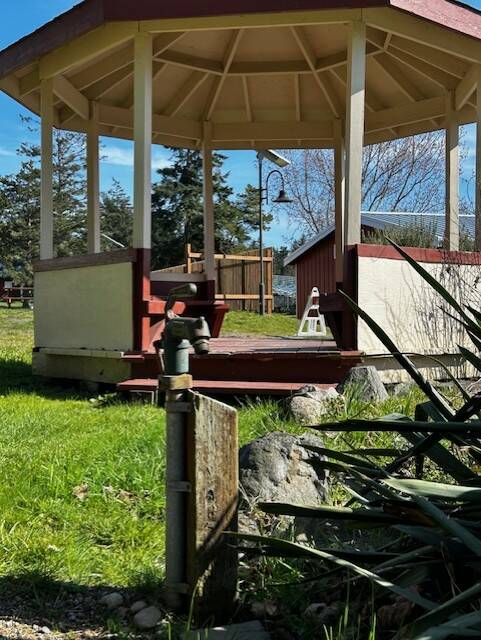The Town of Friday Harbor held a closed record appeal on April 4 at noon, for San Juan County to present evidence that the Fairgrounds has not violated water usage. Because it was a closed record, public comment was not taken, and Jon Cain, San Juan County Deputy Prosecuting Attorney, did not present any new evidence.
“Town staff have made comments implying absolutes,” Cain said toward the beginning of his presentation, insinuating either the town is right or the county is right. “I don’t agree.”
During his allotted hour, Cain described what existed on the fairgrounds at the time it received its Conditional Use permit in 1998. Activities, besides the annual fair, included classes, workshops, sports, dances, senior activities until the Mullis Senior Community Center was built, and a few large events like the Jazz Festival and the Pig War Picnic. The Jazz Festival has not occurred in at least two decades, and the Pig War Picnic now takes place on the grounds of the San Juan Island Historical Museum. Other events, like the COVID vaccination clinics and more recently the Pride Festival have taken place instead.
Although the buildings have been remodeled, the total number of toilets, sinks and showers has overall dropped. According to Cain, water usage is approximately half of what it was during the 90s.
Eight RV sites also remain the same, although they are occasionally rented out during non-fair-occurring events. The CUP states that camping may only occur during special events for no longer than 10 days.
‘There have been modifications, but the uses have not changed. The property has not changed to a different use,” Cain said. “The county’s position is not that it can do what it wants. The town code does not allow more usage, and there are practical limitations. We understand the town is concerned about water use, and finite water. The county is too.”
There is no evidence the county ever paid for the actual water connection. Cain suggested that the county pay the town for that original hook-up and that there be a cap set on the volume of water the fairgrounds can use to give everyone certainty. He closed by requesting that if the town council comes back with an unfavorable decision for the county, specific violations be provided and enough time be given for the county to prepare.
Town Administrator Denice Kulseth pointed to a lack of response for decades from the county over the town’s water concerns.
“The county has the luxury of not providing water to others,” Kulseth addressed the council and explained that protecting water as a resource is going to become increasingly critical. “we have seen over the last few years that the heavy rains in November are not happening. They are now happening in February.” Kulseth added that there are also more frequent heatwaves meaning a higher risk of evaporation off Trout Lake, the town’s main water source. “We are also at capacity, struggling to keep up with the demand in summer,” Kulseth said, continuing that the treatment plant is in dire need of a fourth filter, estimated to cost millions of dollars. “We need to protect our assets, especially in the summer. [The question] isn’t just can we, it is do we want to. What do we want to support with our water? We don’t want to support county businesses,” Kulseth said, adding that while the town supports the fair, all the funding from the fair goes into the county coffers. Kulseth then asked for feedback from the county about the feasibility of any of the options she had suggested; annexing into the town, using water for the fair and the fair only, or drilling a well and disconnecting from the town water.
Cain explained that annexing would not be a simple process, using water for the fair and the fair was essentially the notice of violation which the county does not agree to, and that drilling a will would be time-consuming and costly.
Council members asked a few questions, primarily around the RV sites and whether Cain felt those sites were compliant, and will continue deliberations April 18 at the regular Town Council meeting.



